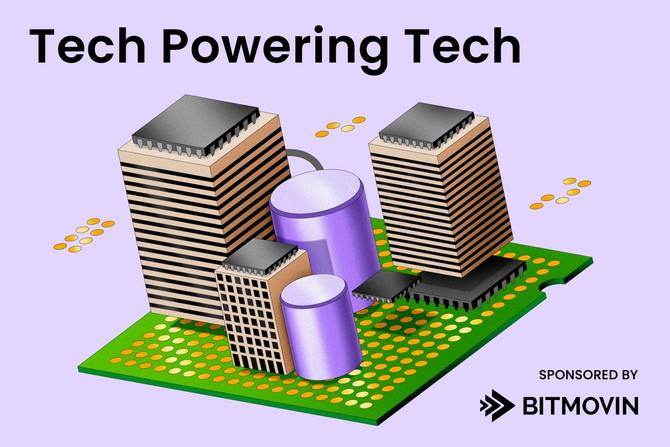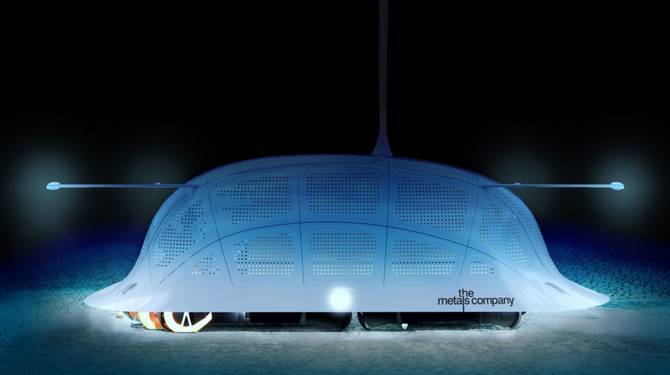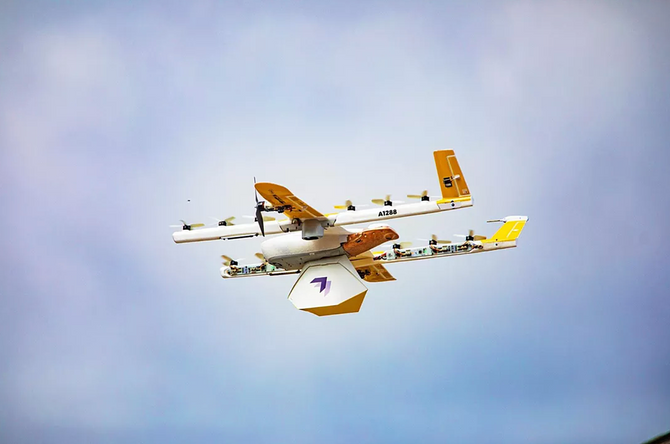Good afternoon. If you happened to catch Jeopardy! last night, one of the contestants—Holly Van Leuven—used to copy-edit this newsletter. Yes, she still remembers us, even though she is now famous. (She has to, because she remains our colleague and is simply focused on other newsletters and content at the Brew.)
Congrats, Holly!
In today’s edition:
 Semiconductor history Semiconductor history
⛏ The Metals Company’s money snag
 Drones in Dallas Drones in Dallas
—Jordan McDonald, Dan McCarthy
|
|
|
Francis Scialabba
Since 1965, semiconductors have followed an exponential trend called Moore’s Law, roughly doubling the number of transistors that can fit on an integrated circuit every two years.
- That has enabled the creation of smaller devices, like smartphones, capable of computational power far greater than the massive, room-sized mainframe computers of yesteryear.
- It also and paved the way for machine learning, cloud computing, autonomous vehicles, and other computationally intensive technologies.
“What happened with semiconductors is, while becoming more complex and capable, they vastly simplified them,” Shahin Farshchi, a partner at Lux Capital and a former electrical engineer, told Emerging Tech Brew.
“That’s the magic that semiconductors brought. By collapsing many billions of components into effectively a single piece of glass, they were able to make these machines many orders of magnitude millions, if not billions, of times more complex while making them millions and billions of times more simple at the same time,” Farshchi said.
Now...The semiconductor industry is worth an estimated $527 billion dollars, and billions of dollars in private and public investment is flowing into the sector as the ongoing shortage proves just how critical this little device is.
To get to this point required at least 200 years of science, engineering, business, and policy advances. We put together an interactive timeline covering key moments in the development of semiconductors, including things like…
- The reveal of ENIAC, the world’s first general-purpose computer, in 1946.
- Shockley Semiconductor Laboratory’s prototype silicone-based semiconductors in 1956.
- The coining of “Silicon Valley” in 1971.
- ASML’s founding in 1984.
- And the supply-chain crunch that we find ourselves mired in today.
Looking ahead...Farshchi sees a world of ever-greater specialization for semiconductors. There’s already been some movement away from general-purpose chips, and toward semiconductors ready-made for specific applications like cloud computing, machine learning, and smartphones, but Farshchi expects this to intensify further.
“I do see a future where the general-purpose processor does less work,” Farshchi said. “I do expect there to be more and more specialized tasks that are being done by specialized computers, and I expect those specialized chips to be far more efficient, far cheaper, and far more performing than they otherwise would be if they were general platforms.”
Click here to read the full piece.–JM
|
|
|
The Metals Company
If you think it’s annoying when a friend ghosts your $14 Venmo request for “ ,” just imagine the frustration of The Metals Company, a deep-sea, battery-metal mining company whose would-be $200 million investor has...simply ignored its promise to buy 20 million shares. ,” just imagine the frustration of The Metals Company, a deep-sea, battery-metal mining company whose would-be $200 million investor has...simply ignored its promise to buy 20 million shares.
After going public in September, The Metals Company hasn’t received $200 million in funding promised by Ramas Capital Management, the Financial Times reports.
- The missing money makes up 60% of the company’s expected private equity in public investment (PIPE) funding, a common post-SPAC injection of cash from institutional investors.
- The company is now suing Ramas Capital Management in the New York Supreme Court.
Context, please
The Metals Company claims it has developed an environmentally friendly way of extracting rare earth metals, like lithium, nickel, and cobalt, from the ocean floor. These metals are necessary to make batteries, and they’re also expected to be in relatively short supply as electric vehicle demand cranks up.
- The company says it’s already identified enough metals to power 280 million EVs, but the environmental consequences of deep sea mining are unclear.
-
In June, 617 marine scientists and policy experts signed a statement calling for a pause on deep-sea mining, “until sufficient and robust scientific information has been obtained to make informed decisions as to whether deep-sea mining can be authorized without significant damage to the marine environment.”
Looking ahead: As FT points out, this leaves The Metals Company with just over $100 million in cash-on-hand, which the company says is “sufficient capital” to meet its goals. But in March it said it’d need $163 million for operations over the next two years, and the company has previously said it will need $7 billion to scale up production in the US by 2026.
View this story on-site.—DM
|
|
|
|
Enter exascale. Or, should we say, exascale will be entering the supercomputing scene.
That’s right. This next big milestone in supercomputing is almost here and ready to transform our lives in big, big ways.
And we’re breaking it down for you. Supercomputing performance is measured in “flops.” The highest performance-level supercomputers have been operating in is petaflops. But with exascale computing, supercomputers will be able to process in the next echelon of flops—exaflops.
This means these supercomputers will process 1 quintillion calculations per second (and more) which is a billion billion —or 10¹⁸—hence: exascale supercomputing.
If you’re loving this breakdown but are wondering what it all means for you as a human operating in your every day, we take a deeper look at how exascale supercomputing will transform your life—everything from the way you fly to the way scientists predict major climate catastrophes.
Read on to explore the scale of exascale.
|
|
|
Wing
Like a fresh-faced college grad, Alphabet’s drone delivery arm Wing is making its first foray into big-city life. The company announced Wednesday that it will partner with Walgreens to begin making deliveries in two parts of the of the Dallas-Fort Worth area.
In recent years, drone delivery services have made meaningful strides, delivering vaccines in Ghana, Samsung phones in Ireland, and foodstuffs in Fayetteville, North Carolina. But most of these deliveries have happened in areas that are much less populous than Dallas-Fort Worth, the fourth-largest metro area in the US with ~7.6 million residents.
- It also marks the first time Wing will allow a third-party (in this case, Walgreens) to load up the drones with packages.
For now, the service is only available in Frisco and Little Elm, both located on the northern border of the DFW metro. But the company says it plans to scale up a commercial service in Dallas in the coming months.
Zoom out: Wing crossed the 100,000 delivery mark earlier this year, with most of the action happening in Australia. It also increased its deliveries by 500% in 2020, Wing’s head of go-to-market Alexa Dennett told us in March.
Impressive milestones no doubt, but a reminder of where drone delivery stands overall: Amazon delivered about 11.5 million packages every single day in 2020. So, it’s early, early innings.
View this story on-site.—DM
|
|
|
|
A higher hiring power. BELAY has over a decade of experience matching clients with talented Virtual Assistants, Bookkeepers, Social Media Managers, and more. They match you with the experienced people you need, so you can focus on the growth you want. Learn everything they know about hiring with their free guide, “Hiring Isn’t Hard: 9 Secrets That Make It Easy.” Check it out here.
|
|
|
Francis Scialabba
Stat: Andreessen Horowitz has grown its investment team by 170% in the last four years, 4x the pace of hiring at peer VC firms. It now has 70 people on the team and manages ~19 billion in assets.
Quote: “The greatest challenge for me was continuing to believe in myself, when all the messages I was getting were that I would never be taken seriously or promoted or given raises—or even hired—at the same rate as men, who were clearly less qualified and not as smart as I was.”—A female engineer who entered the field in the 1970s
Read: Demoing a Reddit-trained AI “Oracle” dubbed Delphi.
Growing pains gains: Help Scout offers the custom tools you need to manage a growing business. Scout’s honor. Are you a customer support leader at an online business with 51–200 employees? Take a qualified meeting with Help Scout and get a $100 Amazon gift card.*
*This is sponsored advertising content
|
|
-
Google altered its image-search algorithms to display more diverse results, in an effort to counter instances of algorithmic bias.
-
Tesla said in its Q3 earnings report that its standard range vehicles will start using LFP batteries, which are made from less expensive and more stable metals, but offer lower range. It also reported record profits.
-
Samsung added some new features to Watch 4, like fall detection.
-
Micron, a major manufacturer of memory chips, says it will spend $150 billion building out its global chipmaking capacity over the next decade.
-
Intel CEO Pat Gelsinger thinks the chip shortage will start to let up in 2023.
|
|
Three of the following news stories are true, and one...we made up. Can you spot the odd one out?
-
For the first time, scientists successfully transplanted a pig kidney into a human.
-
A new cryptocurrency called Worldcoin wants you to stare into a chrome orb to verify your personhood.
-
Peter Luger—the famous Brooklyn, NY, steakhouse—says it will fully transition to lab-grown meat by 2023.
-
A startup raised millions to expand its cartoon hype house.
|
|
Look, when we asked for speculation on the Facebook rebrand last issue, we didn’t think we’d get nearly 100 EMAILS. But we did, thanks to you wonderfully engaged readers. A fine selection of some select responses below...
- MetaFace
- FacePlant (lol)
- Zuck Zuck Goose
- Oasis
For what it’s worth...Someone put together odds on the next FB name, with Virtuel (??) the favorite.
|
|
|
Peter Luger has not announced any intention to embrace lab-grown meat, as far as we know.
|
|
|
Written by
Jordan McDonald and Dan McCarthy
Was this email forwarded to you? Sign up
here.
|
ADVERTISE
//
CAREERS
//
SHOP
//
FAQ
Update your email preferences or unsubscribe
here.
View our privacy policy
here.
Copyright ©
2021
Morning Brew. All rights reserved.
22 W 19th St, 8th Floor, New York, NY 10011
|
|










